中考专区二轮专题---直接引语间接引语课件(共34张PPT)
文档属性
| 名称 | 中考专区二轮专题---直接引语间接引语课件(共34张PPT) |

|
|
| 格式 | ppt | ||
| 文件大小 | 654.0KB | ||
| 资源类型 | 教案 | ||
| 版本资源 | 通用版 | ||
| 科目 | 英语 | ||
| 更新时间 | 2022-05-26 14:08:35 | ||
图片预览

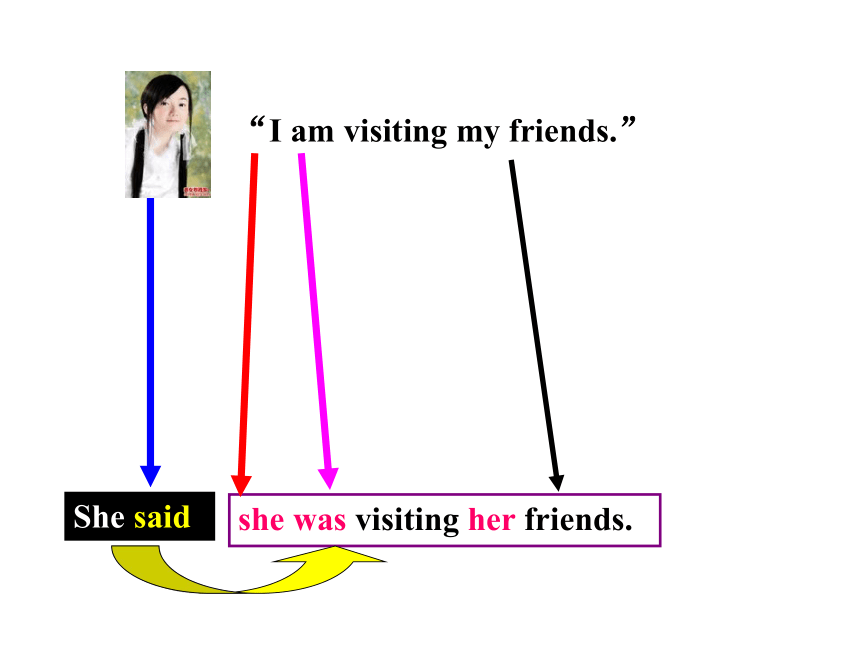
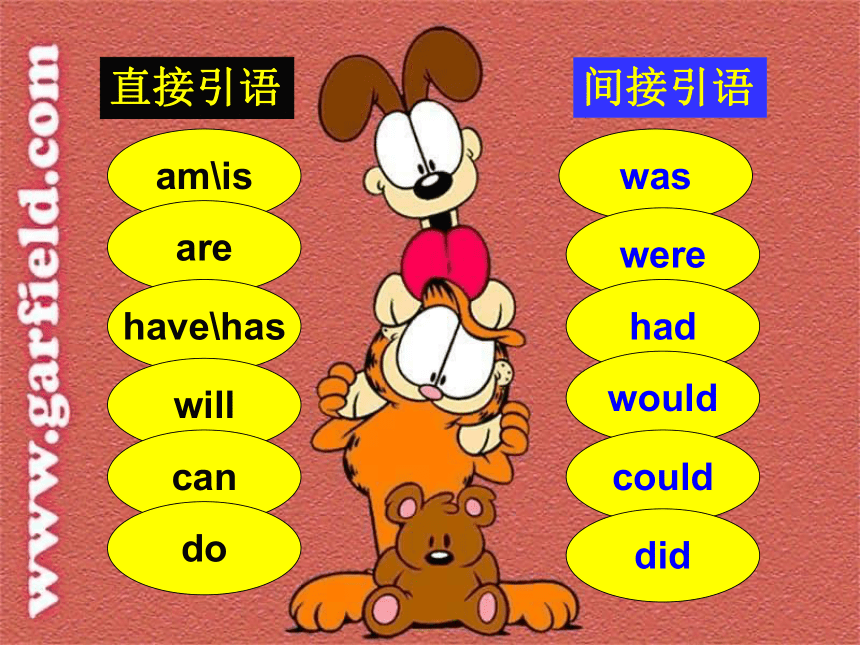
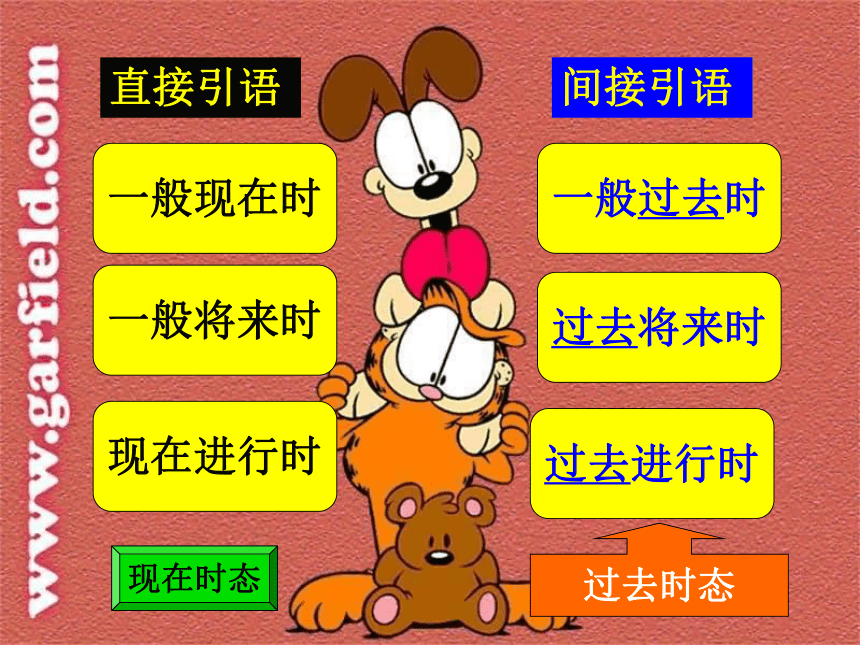
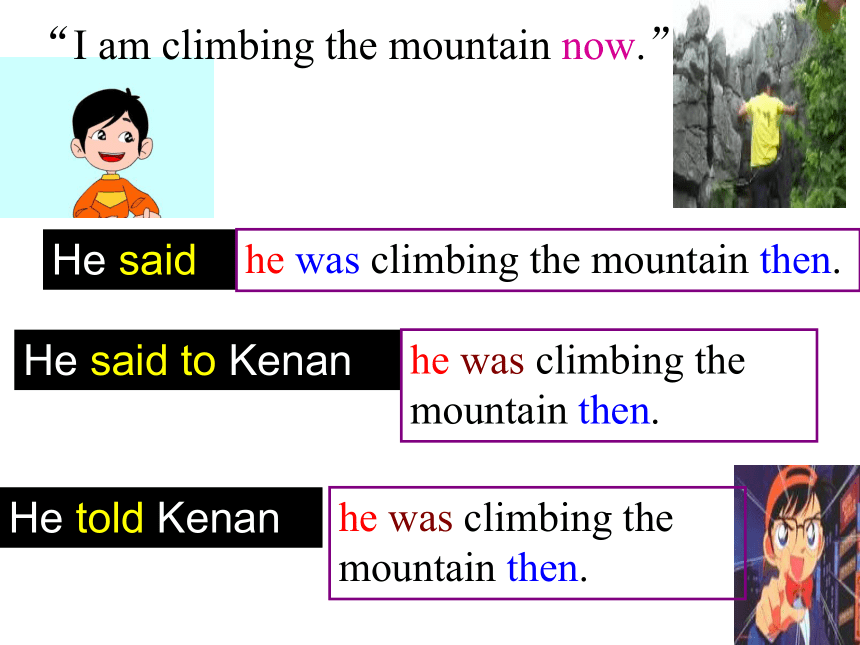
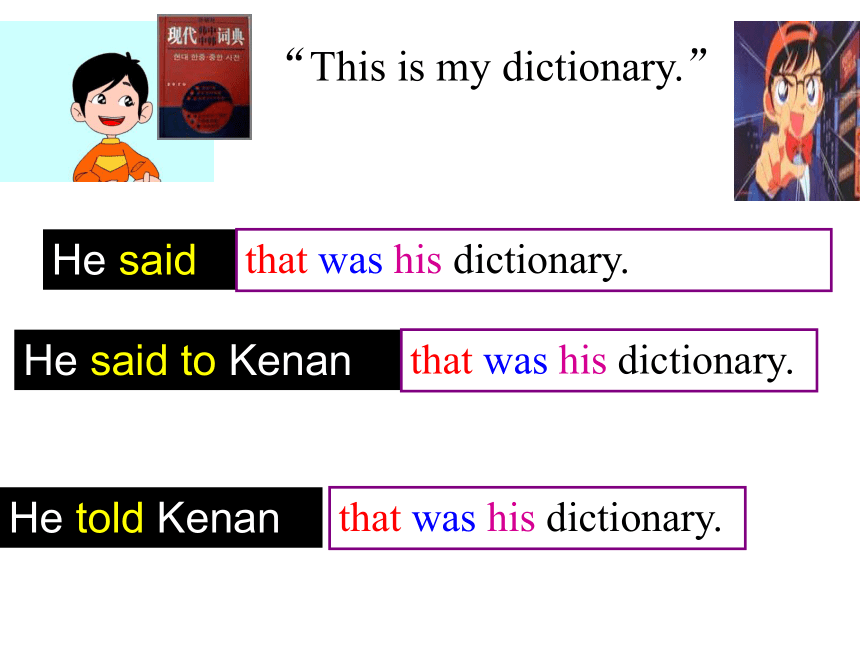
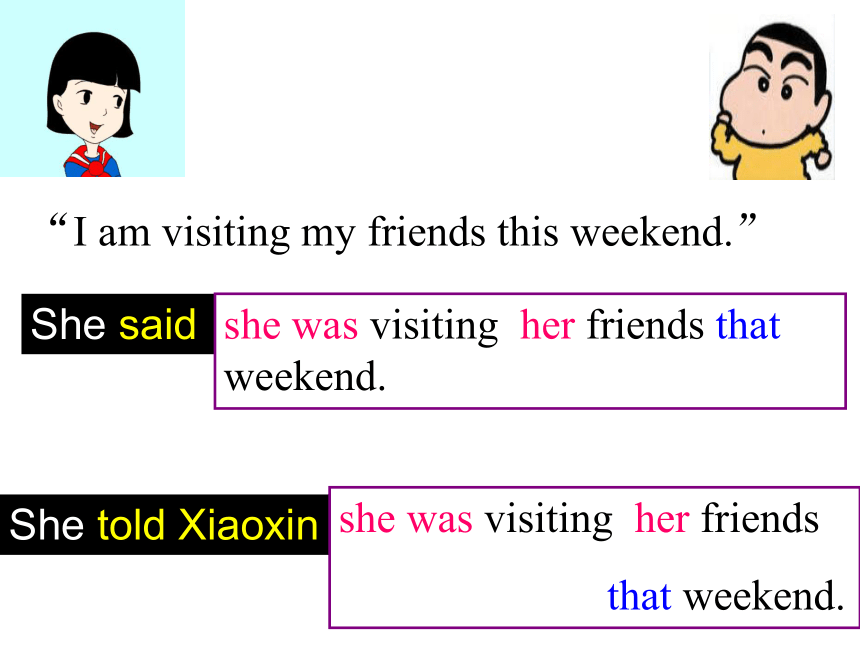
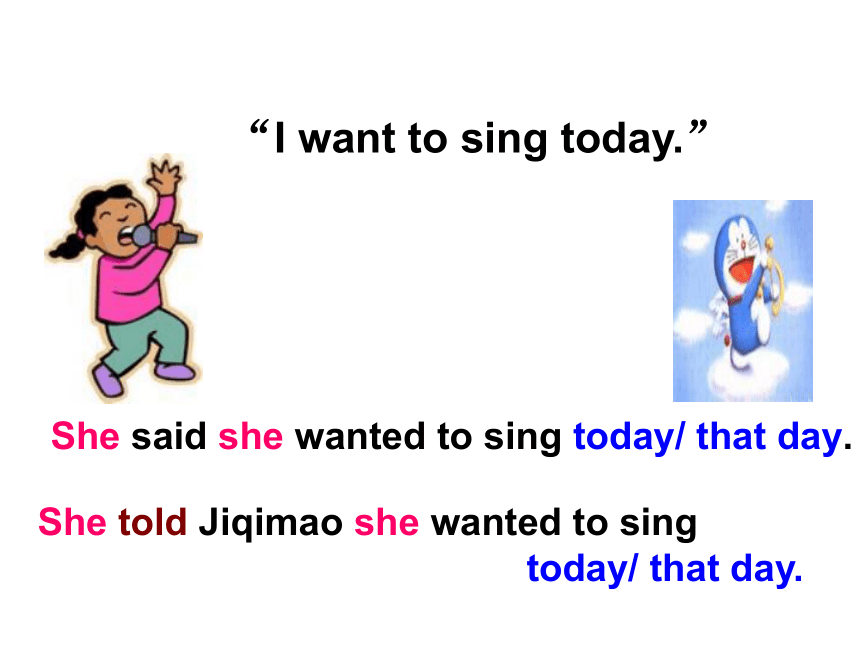
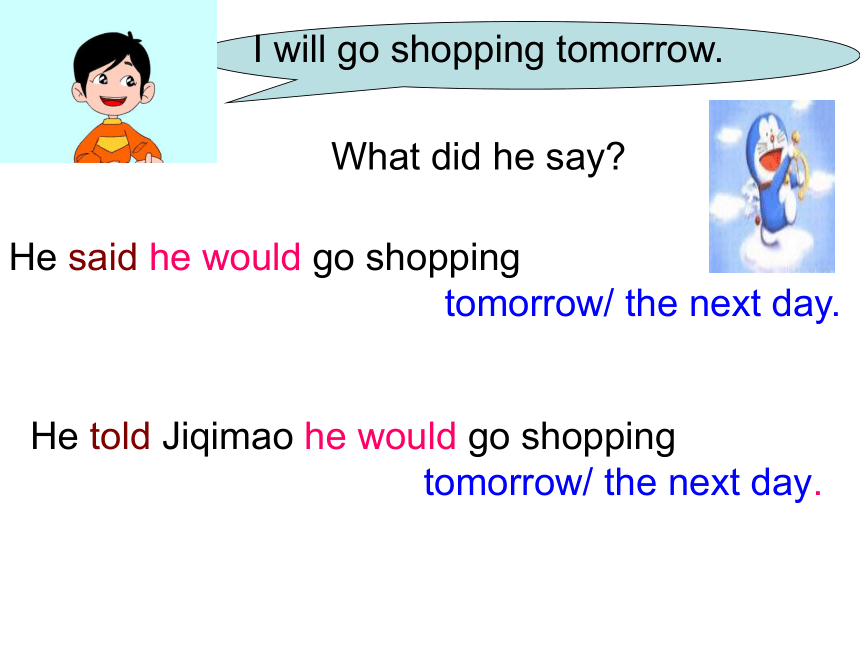
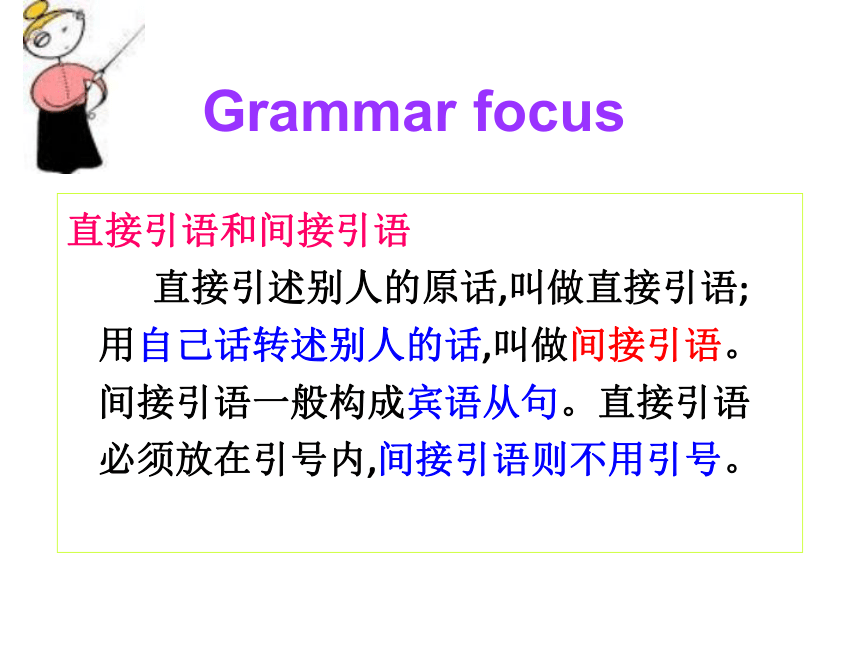
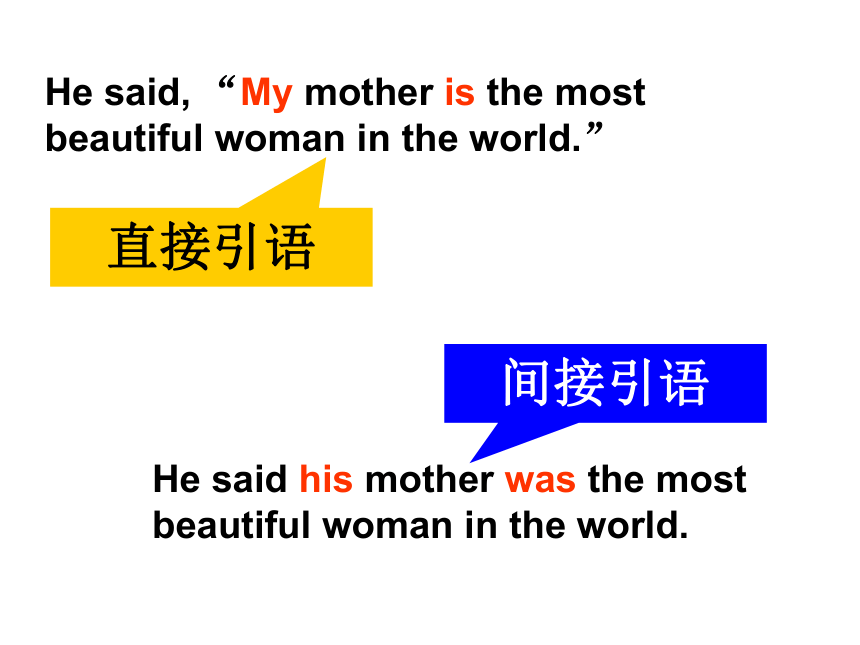
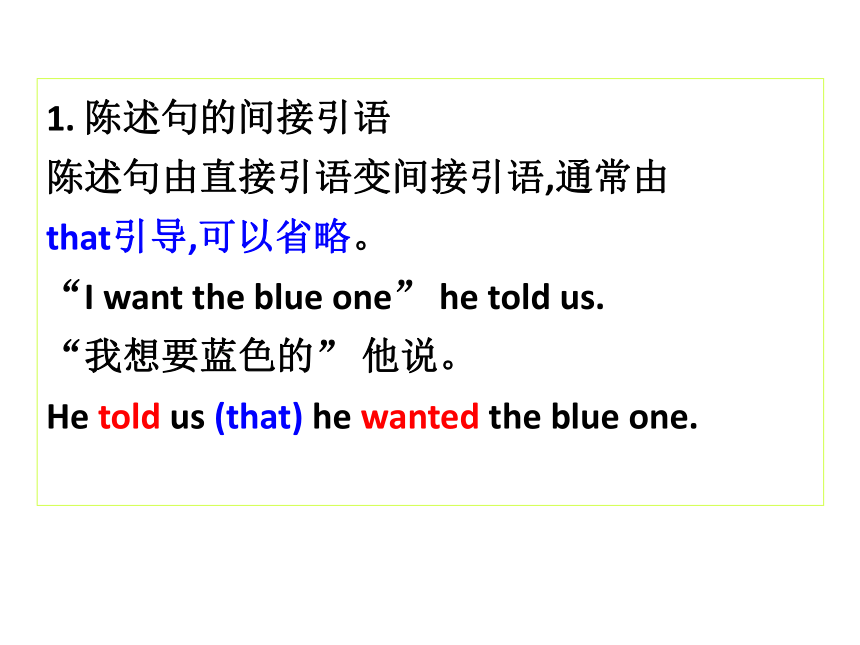
文档简介
(共34张PPT)
“I am going to do my homework.”
He said
he was going to do his homework.
“I am visiting my friends.”
She said
she was visiting her friends.
直接引语
间接引语
am\is
was
are
were
have\has
had
will
would
can
could
do
did
变化
直接引语
间接引语
一般现在时
一般过去时
一般将来时
过去将来时
现在进行时
过去进行时
过去时态
现在时态
时态
“I am climbing the mountain now.”
He said
he was climbing the mountain then.
He told Kenan
he was climbing the mountain then.
He said to Kenan
he was climbing the mountain then.
“This is my dictionary.”
He said
that was his dictionary.
He told Kenan
that was his dictionary.
He said to Kenan
that was his dictionary.
“I am visiting my friends this weekend.”
She said
she was visiting her friends that weekend.
She told Xiaoxin
she was visiting her friends
that weekend.
“I want to sing today.”
She said she wanted to sing today/ that day.
She told Jiqimao she wanted to sing
today/ that day.
I will go shopping tomorrow.
What did he say
He said he would go shopping
tomorrow/ the next day.
He told Jiqimao he would go shopping
tomorrow/ the next day.
直接引语和间接引语
直接引述别人的原话,叫做直接引语; 用自己话转述别人的话,叫做间接引语。间接引语一般构成宾语从句。直接引语 必须放在引号内,间接引语则不用引号。
Grammar focus
He said, “My mother is the most beautiful woman in the world.”
He said his mother was the most beautiful woman in the world.
直接引语
间接引语
1. 陈述句的间接引语
陈述句由直接引语变间接引语,通常由
that引导,可以省略。
“I want the blue one” he told us.
“我想要蓝色的” 他说。
He told us (that) he wanted the blue one.
2. 疑问句的间接引语
直接引语如果是疑问句,变成间接引语后,
叫做间接疑问句。间接疑问句为陈述语
序,句末用句号,动词时态等的变化与间接
陈述句相同。
引述动词常用ask, 间接疑问句一般有三种:
1) 一般疑问句由直接引语变为间接引语
时, 由if 或 whether引导。
如: “Has he ever worked in Shanghai ”
Jim asked.
“他在上海工作过吗 ”吉姆问。
→Jim asked if/whether he had ever
worked in Shanghai.
吉姆问他是否在上海工作过。
“Can you tell me the way to the hospital ”
The old man asked.
那个老人问: “你能告诉我去医院的路吗 ”
→The old man asked whether I could tell
him the way to the hospital.
那个老人问我是否能告诉他去医院的路。
“Do you like to play with the flowers ”I asked the dog.
What did I say
I asked the dog if he liked to
play with the flowers.
Do you think I’m really happy
What did she say to me
She asked if I thought
she was really happy.
2) 特殊疑问句由直接引语变为间接引语
时, 仍由原来的疑问词引导。
如: “Which room do you live in ” He asked. “你住哪个房间?”他问我。
→He asked me which room I lived in. 他问我住哪个房间。
“What do you think of the film ” She
asked her friend.
她问她朋友, “你怎么看这部电影 ”
→She asked her friend what she
thought of the film.
她问她的朋友怎么看这部电影。
Who is my girl friend
What did he say
He asked who his girl friend was.
Where is the milk
What did she say
She asked where the milk was.
3) 选择疑问句由直接引语变为间接引语
时, 由whether/if …or引导。如:
“Is it your bike or Tom’s Mum asked.
妈妈问:“这是你的自行车还是汤姆的 ”
→Mum asked whether/if it was my bike
or Tom’s.
妈妈问这是我的自行车还是汤姆的。
“Does your sister like blue dresses or
green ones ” Kate asked.
“你妹妹喜欢蓝色的裙子还是绿色的 ”
凯特问。
→Kate asked whether/if my sister liked
blue dresses or green ones.
凯特问我的妹妹喜欢蓝色的裙子还是
绿色的。
3. 祈使句的间接引语
当祈使句变为间接引语时,间接祈使句的引述动词常用tell, ask等, 而把直接祈使句变成带to的不定式短语。如:
Jack said, “Please come to my house
tomorrow, Mary.”
杰克说:“玛丽, 明天请到我家来。”
→Jack asked Mary to go to his house
the next day.
杰克请玛丽第二天到他家去。
“Don’t touch anything” He said.
“不要碰任何东西,”他说。
→He told us not to touch anything.
他对我们说不要碰任何东西。
The teacher said to the students, “Stop
talking.”
老师对学生们说: “不要讲话了。”
→The teacher told the students to stop
talking.
老师让学生们不要说话了。
1 直接引语变为间接引语时,须由宾语从 句引导,但从句中需要注意下列各种变化:
1) 人称的变化。如:
He said, “You are right.”
----He said that I was right.
2) 时态的变化。如:
The teacher told his students, “I have been away from home for over ten years.”
----- The teacher told his students that she had been away from home for over ten years.
3) 指示代词、时间状语和地点状语的变化
She said , “I visited Europe last year.”
-----She said that she had visited Europe the year before last.
指示代词、时间状语、地点状语和动词的变化
直接引语 间接引语
指示代词 this, these that, those
时间状语 today
yesterday
tomorrow
next week /month/year that day
the day before
the next day
the next week/month/year
地点状语 here there
动词 come go
时间、地点、指示代词的变化:
1.She said , “That I will come this morning.”
She said that she would go that morning.
2.He said , “These books are mine.”
He said that those books were his.
3.She said , “I went there yesterday.”
She said that she had gone there the day before .
注:1 如果主句中的谓语动词是现在或将来时态,直接引语变为间接引语时,时态一律不变;
“ She is a good student.”
---The teacher says that she is a good student
- --The teacher will say that she is a good student.
2 如果间接引语中表示的是客观真理或客观存在,则时态也不变化。
The teacher said , “The moon moves round the earth.”
----The teacher said that the moon moves round the earth.
2. He said, “It must be late. I really must go.”
-> He said it must be late, and he really must go.
1. He said, “light travels much faster than sound.” (光传播的速度比声音传播速度要快得多。)
-> He said that light travels much faster than sound.
Could you help me think about the problems
3. Mr. and Mrs. Davis said, “We won’t be able to come to dinner today.”
-> They said they wouldn’t be able to dinner that day.
4. “What are you doing, Tom ”
-> I asked Tom what he was doing.
当谓语动词包含无过去时形式的情态助动词时
直接引语是疑问句时
当转述客观真理或引述客观事实时
注意时间状语的变化
1. “I am good at English .” Lucy said.
2. “Li Lei is reading a book.” Peter said
to Lucy.
3. “We will have a football match.” he
told his mother.
Lucy said she was good at English.
Peter told Lucy that Li Lei was
reading a book.
He told his mother they would have a football match tomorrow.
把下列句子变为间接引语。
4. “They go to school every day except Saturday and Sunday.” the boy said.
5. Cousin Sue said, “I’m sorry I didn’t
have time to come over and visit last
Saturday.”
The boy said they went to school every day except Saturday and Sunday.
Cousin Sue said she was sorry she
hadn’t had time to come over and visit the previous Saturday.
Exercises:
1.Mike asked me , “When will their plan land ”
---Mike asked me when their plan would land.
2.He asked : “Where has Li Ming gone ”
---He asked where Li Ming had gone.
3.Sara asked, “Will you come to the lecture this afternoon ”
---Sara asked if I would go to the lecture that afternoon.
4.The teacher asked , “Did you watch TV yesterday ”
---The teacher asked if I had watched TV the day before.
“I am going to do my homework.”
He said
he was going to do his homework.
“I am visiting my friends.”
She said
she was visiting her friends.
直接引语
间接引语
am\is
was
are
were
have\has
had
will
would
can
could
do
did
变化
直接引语
间接引语
一般现在时
一般过去时
一般将来时
过去将来时
现在进行时
过去进行时
过去时态
现在时态
时态
“I am climbing the mountain now.”
He said
he was climbing the mountain then.
He told Kenan
he was climbing the mountain then.
He said to Kenan
he was climbing the mountain then.
“This is my dictionary.”
He said
that was his dictionary.
He told Kenan
that was his dictionary.
He said to Kenan
that was his dictionary.
“I am visiting my friends this weekend.”
She said
she was visiting her friends that weekend.
She told Xiaoxin
she was visiting her friends
that weekend.
“I want to sing today.”
She said she wanted to sing today/ that day.
She told Jiqimao she wanted to sing
today/ that day.
I will go shopping tomorrow.
What did he say
He said he would go shopping
tomorrow/ the next day.
He told Jiqimao he would go shopping
tomorrow/ the next day.
直接引语和间接引语
直接引述别人的原话,叫做直接引语; 用自己话转述别人的话,叫做间接引语。间接引语一般构成宾语从句。直接引语 必须放在引号内,间接引语则不用引号。
Grammar focus
He said, “My mother is the most beautiful woman in the world.”
He said his mother was the most beautiful woman in the world.
直接引语
间接引语
1. 陈述句的间接引语
陈述句由直接引语变间接引语,通常由
that引导,可以省略。
“I want the blue one” he told us.
“我想要蓝色的” 他说。
He told us (that) he wanted the blue one.
2. 疑问句的间接引语
直接引语如果是疑问句,变成间接引语后,
叫做间接疑问句。间接疑问句为陈述语
序,句末用句号,动词时态等的变化与间接
陈述句相同。
引述动词常用ask, 间接疑问句一般有三种:
1) 一般疑问句由直接引语变为间接引语
时, 由if 或 whether引导。
如: “Has he ever worked in Shanghai ”
Jim asked.
“他在上海工作过吗 ”吉姆问。
→Jim asked if/whether he had ever
worked in Shanghai.
吉姆问他是否在上海工作过。
“Can you tell me the way to the hospital ”
The old man asked.
那个老人问: “你能告诉我去医院的路吗 ”
→The old man asked whether I could tell
him the way to the hospital.
那个老人问我是否能告诉他去医院的路。
“Do you like to play with the flowers ”I asked the dog.
What did I say
I asked the dog if he liked to
play with the flowers.
Do you think I’m really happy
What did she say to me
She asked if I thought
she was really happy.
2) 特殊疑问句由直接引语变为间接引语
时, 仍由原来的疑问词引导。
如: “Which room do you live in ” He asked. “你住哪个房间?”他问我。
→He asked me which room I lived in. 他问我住哪个房间。
“What do you think of the film ” She
asked her friend.
她问她朋友, “你怎么看这部电影 ”
→She asked her friend what she
thought of the film.
她问她的朋友怎么看这部电影。
Who is my girl friend
What did he say
He asked who his girl friend was.
Where is the milk
What did she say
She asked where the milk was.
3) 选择疑问句由直接引语变为间接引语
时, 由whether/if …or引导。如:
“Is it your bike or Tom’s Mum asked.
妈妈问:“这是你的自行车还是汤姆的 ”
→Mum asked whether/if it was my bike
or Tom’s.
妈妈问这是我的自行车还是汤姆的。
“Does your sister like blue dresses or
green ones ” Kate asked.
“你妹妹喜欢蓝色的裙子还是绿色的 ”
凯特问。
→Kate asked whether/if my sister liked
blue dresses or green ones.
凯特问我的妹妹喜欢蓝色的裙子还是
绿色的。
3. 祈使句的间接引语
当祈使句变为间接引语时,间接祈使句的引述动词常用tell, ask等, 而把直接祈使句变成带to的不定式短语。如:
Jack said, “Please come to my house
tomorrow, Mary.”
杰克说:“玛丽, 明天请到我家来。”
→Jack asked Mary to go to his house
the next day.
杰克请玛丽第二天到他家去。
“Don’t touch anything” He said.
“不要碰任何东西,”他说。
→He told us not to touch anything.
他对我们说不要碰任何东西。
The teacher said to the students, “Stop
talking.”
老师对学生们说: “不要讲话了。”
→The teacher told the students to stop
talking.
老师让学生们不要说话了。
1 直接引语变为间接引语时,须由宾语从 句引导,但从句中需要注意下列各种变化:
1) 人称的变化。如:
He said, “You are right.”
----He said that I was right.
2) 时态的变化。如:
The teacher told his students, “I have been away from home for over ten years.”
----- The teacher told his students that she had been away from home for over ten years.
3) 指示代词、时间状语和地点状语的变化
She said , “I visited Europe last year.”
-----She said that she had visited Europe the year before last.
指示代词、时间状语、地点状语和动词的变化
直接引语 间接引语
指示代词 this, these that, those
时间状语 today
yesterday
tomorrow
next week /month/year that day
the day before
the next day
the next week/month/year
地点状语 here there
动词 come go
时间、地点、指示代词的变化:
1.She said , “That I will come this morning.”
She said that she would go that morning.
2.He said , “These books are mine.”
He said that those books were his.
3.She said , “I went there yesterday.”
She said that she had gone there the day before .
注:1 如果主句中的谓语动词是现在或将来时态,直接引语变为间接引语时,时态一律不变;
“ She is a good student.”
---The teacher says that she is a good student
- --The teacher will say that she is a good student.
2 如果间接引语中表示的是客观真理或客观存在,则时态也不变化。
The teacher said , “The moon moves round the earth.”
----The teacher said that the moon moves round the earth.
2. He said, “It must be late. I really must go.”
-> He said it must be late, and he really must go.
1. He said, “light travels much faster than sound.” (光传播的速度比声音传播速度要快得多。)
-> He said that light travels much faster than sound.
Could you help me think about the problems
3. Mr. and Mrs. Davis said, “We won’t be able to come to dinner today.”
-> They said they wouldn’t be able to dinner that day.
4. “What are you doing, Tom ”
-> I asked Tom what he was doing.
当谓语动词包含无过去时形式的情态助动词时
直接引语是疑问句时
当转述客观真理或引述客观事实时
注意时间状语的变化
1. “I am good at English .” Lucy said.
2. “Li Lei is reading a book.” Peter said
to Lucy.
3. “We will have a football match.” he
told his mother.
Lucy said she was good at English.
Peter told Lucy that Li Lei was
reading a book.
He told his mother they would have a football match tomorrow.
把下列句子变为间接引语。
4. “They go to school every day except Saturday and Sunday.” the boy said.
5. Cousin Sue said, “I’m sorry I didn’t
have time to come over and visit last
Saturday.”
The boy said they went to school every day except Saturday and Sunday.
Cousin Sue said she was sorry she
hadn’t had time to come over and visit the previous Saturday.
Exercises:
1.Mike asked me , “When will their plan land ”
---Mike asked me when their plan would land.
2.He asked : “Where has Li Ming gone ”
---He asked where Li Ming had gone.
3.Sara asked, “Will you come to the lecture this afternoon ”
---Sara asked if I would go to the lecture that afternoon.
4.The teacher asked , “Did you watch TV yesterday ”
---The teacher asked if I had watched TV the day before.
同课章节目录
- 词法
- 名词
- 动词和动词短语
- 动词语态
- 动词时态
- 助动词和情态动词
- 非谓语动词
- 冠词
- 代词
- 数词和量词
- 形容词副词及其比较等级
- 介词和介词短语
- 连词和感叹词
- 构词法
- 相似、相近词比较
- 句法
- 陈述句
- 一般疑问句和否定疑问句
- 特殊疑问句及选择疑问句
- 反意疑问句
- 存在句(There be句型)
- 宾语从句
- 定语从句
- 状语从句
- 主谓一致问题
- 简单句
- 并列句
- 复合句
- 主谓一致
- 主、表语从句
- 名词性从句
- 直接引语和间接引语
- 虚拟语气
- 感叹句
- 强调句
- 倒装句
- 祈使句
- 句子的成分
- 句子的分类
- 题型专区
- 单项选择部分
- 易错题
- 完形填空
- 阅读理解
- 词汇练习
- 听说训练
- 句型转换
- 补全对话
- 短文改错
- 翻译
- 书面表达
- 任务型阅读
- 语法填空
- 其他资料
